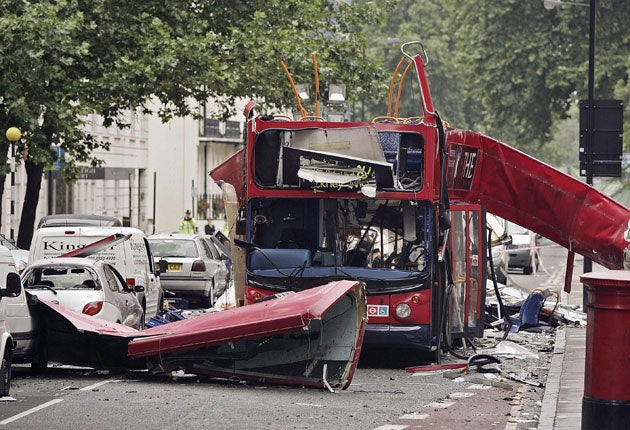Relatives of those killed in the 7/7 bombings called on a coroner today to make a series of recommendations to prevent future deaths.
Lawyers for the bereaved families said there were 32 specific areas where action needed to be taken to protect the safety of the public.
They include nine points relating to the alleged failure by MI5 and the police to prevent the attacks on London's transport network on July 7 2005.
The recommendations proposed by the relatives also encompass the use of plain English by the emergency services to avoid misunderstandings which could cost lives.
The coroner, Lady Justice Hallett, hit out at baffling management jargon last week, saying: "When it comes to a situation like a major incident, people do not understand who and what the other person is."
The inquest into the deaths of the 52 innocent victims of the suicide bombings on three Tube trains and a bus is drawing to a close after hearing five months of evidence.
It has a wide-ranging remit to examine whether the emergency services' response was adequate and whether MI5 and the police could have prevented the attacks.
The coroner today heard submissions about what findings she should make under "Rule 43", which gives her powers to make recommendations to prevent deaths in the future.
Barrister Caoilfhionn Gallagher outlined the measures sought by the bereaved relatives.
She said: "For many of the families today in one way is the most important part because it is looking to the future and seeing whether lessons can be learned from the atrocities of 7/7 and whether the deaths of their loved ones can contribute to saving others."
One of the recommendations proposed by the bereaved relatives covers stricter rules about the sale of hydrogen peroxide, which was the main ingredient in the home-made bombs used in the 7/7 attacks.
The terrorists openly bought large quantities of liquid oxygen, which can be boiled down to get hydrogen peroxide, from a number of different stores.
Ms Gallagher said Britain had lagged behind other countries, including Australia and Canada, in introducing restrictions on the availability of the chemical.
She said: "It is a concern on the part of at least some of the families that the UK has been relatively slow to act on this issue.
"Here we are in 2011, in circumstances where hydrogen peroxide was used in the 7/7 bombings, was used in the failed July 21 bombings and was also the substance of choice for the transatlantic airline plot...
"Almost six years after 7/7 a recommendation is still justified to emphasise the need for this to be dealt with very quickly."
Christopher Coltart, another barrister for relatives of the victims, illustrated the need for clear use of language by quoting from the Cabinet Office's "Emergency Responder Inter-Operability Lexicon".
He ironically suggested that a firefighter at a major incident would be aided by the guide's definition of the "common recognised information picture" as "a single, authoritative strategic overview of an emergency or crisis that is developed according to a standard template".
The coroner said: "Sorry, I'm lost."
Mr Coltart went on: "I suspect he might be too.
"Although he would no doubt be assisted by the definition later in the document of 'evening civil twilight', which is helpfully explained as 'that period between sunset and total darkness when it is necessary to use artificial light to carry out most activities'.
"So if he wasn't entirely sure as to when he should switch on his torch, the lexicon is close at hand.
"It is a nonsense, I'm afraid. We all speak English. There is no reason for us not to communicate in plain English."
Mr Coltart also called for London Fire Brigade to consider whether firefighters should be given more discretion when deciding whether it is safe to proceed to the site of an incident.
He said: "The fact of the matter is that on July 7, 2005 they were operating in the same environment as the other emergency responders and yet did not take or were not willing to take the same calculated risks that were being taken by, for example, British Transport Police at King's Cross.
"There are other examples which we could bring to mind if it was thought necessary.
"In our submission the sense has emerged from the inquest that the pendulum may have swung to far in favour of an overly cautious approach."
Other recommendations proposed by the bereaved families include:
:: Improving inter-agency training for members of the emergency services at all levels for dealing with major incidents, including looking at whether it should be compulsory and more regular;
:: Considering whether first aid kits can be kept on Underground trains;
:: Devising a system to confirm when the electricity is switched off in Tube tracks - the inquest heard some firefighters delayed going down to the bombed trains while they checked the power was not on;
:: Giving London Underground emergency response vehicles "blue light" status when responding to an urgent incident - on July 7 at least one was very badly held up by traffic;
:: Looking into obtaining specialist stretchers for Tube stations;
:: Changing the rules on assessing casualties so medical staff do not categorise as dead someone who is not breathing but has a pulse;
:: Considering giving London Ambulance Service staff specialist training in treating bomb blast and gunshot injuries;
:: Investigating whether public funding can be made available for the London Air Ambulance, also known as the Helicopter Emergency Medical Service (HEMS).
Subscribe to Independent Premium to bookmark this article
Want to bookmark your favourite articles and stories to read or reference later? Start your Independent Premium subscription today.


Join our commenting forum
Join thought-provoking conversations, follow other Independent readers and see their replies